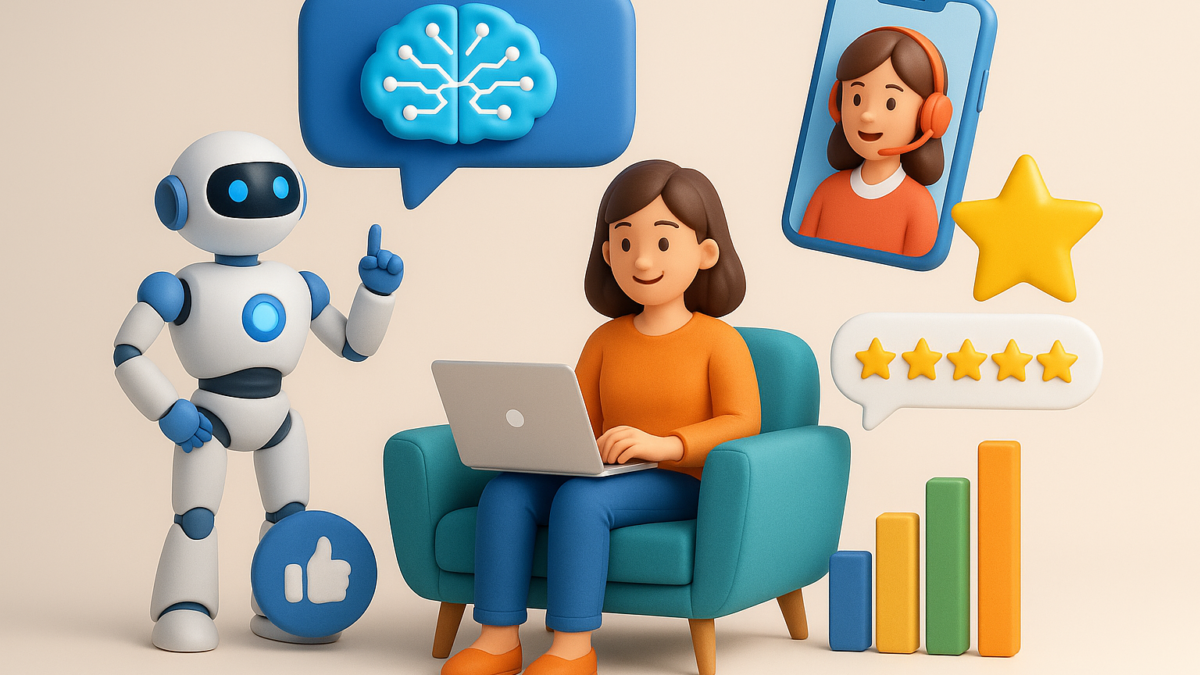AI in 2025: Personalizing and Automating Customer Experience
In 2025, customer experience (CX) has become the ultimate brand differentiator even more than product quality or price. With AI (Artificial Intelligence) evolving faster than ever, businesses are shifting from customer service to customer intelligence using data, prediction, and personalization to create experiences that feel truly human.
From chatbots that understand emotion to predictive systems that anticipate customer needs, AI is transforming how brands engage and retain customers. This blog explores how AI-powered CX is driving loyalty, efficiency, and long-term growth across industries.
The Shift from Service to Experience
In the past, CX was about support solving customer problems efficiently. But today, it’s about creating memorable, hyper-personalized experiences that build emotional connections.
A recent PwC study shows that 73% of consumers say a positive experience is key to brand loyalty, yet only 49% feel that companies deliver it consistently.
AI is changing that enabling brands to go beyond reactive support and deliver proactive, predictive, and personalized engagement.
How AI Is Transforming Customer Experience
1. Predictive Personalization
AI uses massive data sets from browsing behavior and past purchases to social sentiment to predict what a customer wants before they ask.
For example:
- E-commerce: AI-driven recommendations based on purchase intent, not just history.
- Banking: Predictive offers tailored to spending patterns.
- Healthcare: Personalized wellness plans using wearable data.
This anticipatory personalization helps brands deliver value faster and stay one step ahead of competitors.
2. Conversational AI and Emotional Intelligence
Modern AI-powered chatbots go far beyond scripted replies. Through Natural Language Processing (NLP) and sentiment analysis, they detect tone, emotion, and context.
- Example: A frustrated customer gets empathetic messaging and priority routing to a human agent.
- Result: Reduced churn and stronger emotional trust.
Brands like Spotify, Sephora, and Delta Airlines already use emotionally intelligent AI to make customer interactions more natural and personalized at scale.
3. Real-Time Feedback and Adaptive Support
AI can analyze customer feedback instantly across multiple channels — email, chat, social, and surveys. It identifies dissatisfaction triggers and suggests real-time resolutions.
For instance, AI might alert a brand that 60% of users drop off at checkout and recommend UX improvements.
This closed-loop learning system continuously enhances customer journeys and drives conversion.
4. Hyper-Automation for Faster Resolutions
Through automation, AI helps support teams work smarter, not harder.
- Ticket triaging routes issues to the right departments automatically.
- Self-service bots resolve routine queries in seconds.
- Voice assistants provide instant answers 24/7.
This reduces response time while freeing human agents to handle complex, empathy-driven interactions.
5. Predicting Churn Before It Happens
AI algorithms can identify at-risk customers based on engagement patterns — such as decreased usage, negative feedback, or billing delays.
By spotting these signals early, brands can proactively intervene with personalized offers, loyalty programs, or follow-up calls.
It’s no longer about fixing churn; it’s about preventing it.
Case Study: Starbucks’ AI-Driven Customer Retention
Starbucks’ “Deep Brew” AI platform combines personalization and predictive analytics to tailor offers in real time.
Using data from its mobile app, purchase history, and even weather patterns, Deep Brew sends the perfect offer — like a cold brew coupon on a hot afternoon.
The result? A measurable boost in retention and a 23% increase in repeat purchases — proving that personalization powered by AI directly impacts revenue.
The Benefits of AI-Enhanced CX
Increased Loyalty: Personalized engagement drives repeat purchases and advocacy.
Higher Efficiency: Automation lowers operational costs and reduces human workload.
Data-Driven Growth: Predictive analytics inform smarter business decisions.
Customer-Centric Innovation: AI uncovers new ways to serve, delight, and retain.
Challenges and the Road Ahead
Despite its potential, AI-driven CX comes with challenges:
- Data Privacy: Stricter regulations like GDPR and CCPA require transparency.
- Bias in Algorithms: Poorly trained AI can misinterpret tone or preferences.
- Integration Complexity: Legacy systems often struggle to keep up.
By combining ethical AI design with clear consent-based personalization, brands can overcome these barriers and deliver trust-based, intelligent CX at scale.
Conclusion
As we move deeper into 2025, AI in customer experience isn’t just a trend it’s a business imperative. Brands that understand customers emotionally, predict needs intelligently, and respond instantly will own the future of loyalty.
AI allows companies to move from reactive service to proactive delight creating experiences that are not just personalized, but humanized.
Ready to fill your pipeline with qualified leads? Get started with iTMunch’s B2B lead generation services today.
You May Also Like: From Downloads to Demand: How to Turn Whitepaper Leads into Revenue





